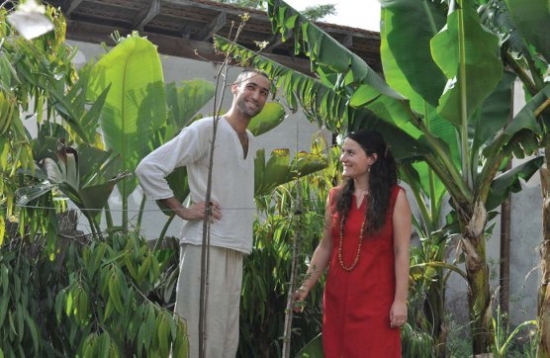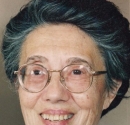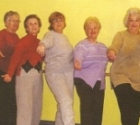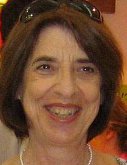
Considered by many scholars to be the oldest healing science, Ayurveda is a holistic approach to health that is designed to help people live long, healthy and well-balanced lives.
I first met Leslie Rayne back in 1977 when he was the aliya shaliach (emissary) for northern England and I was working as the aliya secretary of the Jewish Agency at Mamlock House, the heart of north Manchester Anglo-Jewry. Leslie was a kind, caring person and I became good friends with his wife Hedva and their two small boys, Shai and Ami. Sadly, Leslie passed away four years ago, but I well remember his open smile and his willingness to help at all times, especially after our aliya in 1979 when he assisted us in moving from the absorption center in Raanana to our first home in Ramat Gan.
Fast forward to 2011 – Hedva lives on the next street to me in Ramat Aviv and our friendship continues to this day. Shai, now 40, resides in Florida where he works as a website designer. Ami, 37, is an Ayurveda practitioner. He lives in the beautiful rural settlement of Ein Iron, close to Caesarea, with his wife, Yael, 30, where they run a clinic and cottage industry business together.
I recently visited the couple to discover just what Ayurveda is and how a young Israeli boy grew up to became so fascinated with and knowledgeable, even expert, in the holistic medicine of India and who now dresses in Indian-style clothing.
Upon arrival, we were greeted with the aroma of burning incense. A massive palm tree in the front garden is home to many birds and wildlife feeding and thriving in their natural habitat. The living room is brimming with an impressive book collection, plants, fruits and flowers, with seating arrangements of huge cushions and mattresses on the floor. The open balcony displays additional cushions, a hammock and a garden partially enclosed by a variety of trees, some of which provide herbs that are utilized in the products. The clinic features unusual equipment for use with the products that they make by first collecting and then grinding herbs to produce medicines which are used in conjunction with treatments. There are also tea and coffee substitutes of many types designed to aid digestion, reduce internal heat and bring clarity to the mind, which are available for sale. I was especially fascinated with the cigarettes imported from India that are actually beneficial for breathing problems! There is also a large sauna type tent for sweating treatments after massages, which detoxify the body.
We were soon enjoying welcome cups of aromatic and delicious homemade herbal tea. I was then interested to hear from Ami (now a tall, gentle, striking man) how this way of life came about.
After three years of army service, where Ami served in the Combat Engineering Corps, he planned to take time off to travel, like most young Israelis, and thought first to travel to South America. Attending a lecture that described traveling abroad and the likely perils to be encountered, particularly in South America, Ami decided that perhaps India would be a better choice. Thus, his first trip to India lasted six months. After returning to Israel he attended Tel Aviv University and obtained a degree in physics and philosophy. Since Ayurveda is depicted as the "Science of Life", today Ami feels that, even back then, he was starting the learning process. Focusing on Eastern philosophy, he returned to India for two and a half years. Starting with an Ayurveda massage course, he slowly became more and more interested in the whole science of Ayurveda, studying with various teachers, which included some time as a student at the Gujarat Ayurveda University. During this period he was offered a scholarship to carry on with his studies but, following the advice of his principal professor, decided to continue his training alone for a further two and a half years.
Diagnosing patients began after one year and upon completion of his studies, Ami once again returned home to Israel. He opened a clinic in Tel Aviv and subsequently built a program that he taught in a medical college for one year. As a next step he opened an Ayurveda department at the well known Reidman Center, with a 4-year program, each with classes of 12 students.
During this time he met and married one of his students, Yael. Yael, daughter of Gadi Spector and Israeli artist Miri Spector-Chernitz, had been fascinated by Indian medicine since her first trip to India when she was 23. She too studied in Reidman College and in India, where she focused on Ayurvedic treatments for women, child healthcare and pregnancy support. Her graceful charm combined with her calm, smiling manner readily complement and support Ami in their work, making her an ideal partner in their chosen path.
Considered by many scholars to be the oldest healing science, Ayurveda is a holistic approach to health that is designed to help people live long, healthy and well-balanced lives. The term Ayurveda is taken from the Sanskrit words ayush, meaning life or lifespan, and veda, meaning knowledge. It has been practiced in India for at least 5,000 years and recently started to become popular in Western cultures. Books date back to more than 3,000 years ago but are probably much older, with many versions of books on the same specific topics by different translators. The basic principle of Ayurveda is to prevent and treat illness by maintaining balance in the body, mind and consciousness through an appropriate diet and lifestyle as well as herbal remedies.
It is widely agreed that Ayurvedic therapies are unlikely to have negative side effects.
There are techniques involved but the essence of the meaning is a deep philosophy. The definitions can be classified as: what is life, what is pathology, what is health? Once the balance is understood, only then can techniques be introduced and, in fact, the basis of all ancient medicine is similar. Finding the balance between heat and cold; heavy and light; oily and dry - each need to be in the correct measure, which is different in every person and, surprisingly, at different times of the season or even times of the day, and the balance varies. Thus, each problem or imbalance requires a different approach.
The initial meeting for Ayurveda treatments involves answering extensive lifestyle and health questions, observation of the patient by the practitioner, and a physical examination. Although a patient will approach with specific problems, he or she will be treated as a whole person. Since people react very differently even with the same symptoms, recommended treatments are prescribed individually. Typical treatments would require five to ten meetings over a period of three to six months and would consist of diagnosis, personal diet and daily routine guidance, medicinal herbal formulas, massages and other individually recommended procedures as needed.
Ami made the comparison of learning to drive. It is very difficult to coordinate all that is required to learn at first but after practice everything becomes automatic. It is the same with the treatment.
Common reasons for seeking Ayurveda treatment: Headaches; over/underweight; urinary problems/infections; allergies; digestive problems; stress, tension and depression and skin problems. It is also possible to treat people for the side effects of Western medicine, for instance chemotherapy.
A patient may say: "I do not feel well". In fact there are six stages of disease – only the fourth one produces preliminary signs of disease, i.e. actual physical symptoms. Still, in Ayurveda, earlier stages can be diagnosed and treated. The earlier the treatment, the easier the return to good health will be. There is an allegory told in Ayurveda: “If you take a seedling from the earth, it is easy, but if you wait until it has become a tree, it will be difficult to uproot, and the uprooting itself might cause damage”.
Ayurveda looks at the whole way the body is functioning and believes that "you are what you eat", meaning that eating healthily is of major importance to the body. Symptoms can have external and internal causes, so, it is stressed that good eating habits and routine are essential for good health. Simplicity is recommended; also it is preferable not to eat too many food types at one meal, to eat only when hungry and then to wait approximately three hours before eating again to give the body time to digest. For every disease, condition or problem, a specific diet can be recommended and should not be too strict as dieting can result in pain problems.
"Everything can be a medicine or a poison", it depends on how you use it. Ayurveda never says you must or must not. It is recommended that food should be warm and not dry. The amount is important so it is best not to feel too full after a meal but to always eat in moderation. Spices are a good way to change the qualities of a dish; for example, milk is cold and heavy but if combined with ginger and turmeric, that is heating and drying, it will help the body to absorb it. Such spices can also be used as an infusion in tea. Herbs are best taken before and after meals.
While screening a number of traditional Vedic formulas, scientists discovered that one of the most important of all Ayurvedic compounds is Triphala, which is a botanical preparation comprised of equal parts of three herbal fruits: Harada (Terminalia chebula, black myrobalan, the Buddha’s Chosen Herb), Amla (Emblica officinalis or Indian gooseberry), and Bihara (Terminalia bellerica) which has a number of health benefits, including lowering cholesterol, normalizing blood pressure and protecting and improving liver function.
Ayurveda emphasizes that not only is the herb important, but also the way it is taken. The dose and time of day taken have a great effect. For example the formula Triphala is known as a gentle laxative, is beneficial for eyes, and strengthens the immune system. Only if it is taken in a large dose in the evening will it have the laxative effect, and when taken in a small dose early in the morning, it will strengthen the immune system.
Ayurvedic massage addresses specific needs, likely attributed to imbalance. For example, if you feel great stress, massaging the center of the forehead, which is referred to as the third eye, will relax you and help you to focus and concentrate better. Massage oils may be rubbed into the base of your spine and head to promote better memory retention.
Ayurveda and yoga are very strongly connected. Yoga was originally a system of spiritual development and Ayurveda a system of medicine. Yoga has help from Ayurveda to enable the body to become healthier and more balanced and Ayurveda is assisted by yoga to clarify the mind, although it is true that in many places yoga is used simply as exercise.
Ami and Yael hold workshops on a regular basis on a variety of topics including cooking, pregnancy, general health, diet and skin problems. Yael specializes in treating a range of gynecological issues, from menstruation to pregnancy, and ensuring a fit and healthy delivery.
From time to time seminars are held from Thursday evenings until Saturday nights in the Galilee, that include learning to cook the Ayurveda way, yoga and massage.
Ami & Yael Raynetel: 054 567 5615, email amiayu@gmail.com, website: www.ayu.co.il.
 MEMBERSHOP PERKS-An ESRA Modiin Initiative
MEMBERSHOP PERKS-An ESRA Modiin Initiative KINDERTRANSPORT JUNE 5-6 1939
KINDERTRANSPORT JUNE 5-6 1939 HOW TO CARE FOR YOUR CHILD'S TEETH
HOW TO CARE FOR YOUR CHILD'S TEETH Yad Sarah's new house in Raanana
Yad Sarah's new house in Raanana English speaking Feldenkreis
English speaking Feldenkreis Men don't Make Passes at Girls who Wear Glasses
Men don't Make Passes at Girls who Wear Glasses Sybil Levin
Sybil Levin